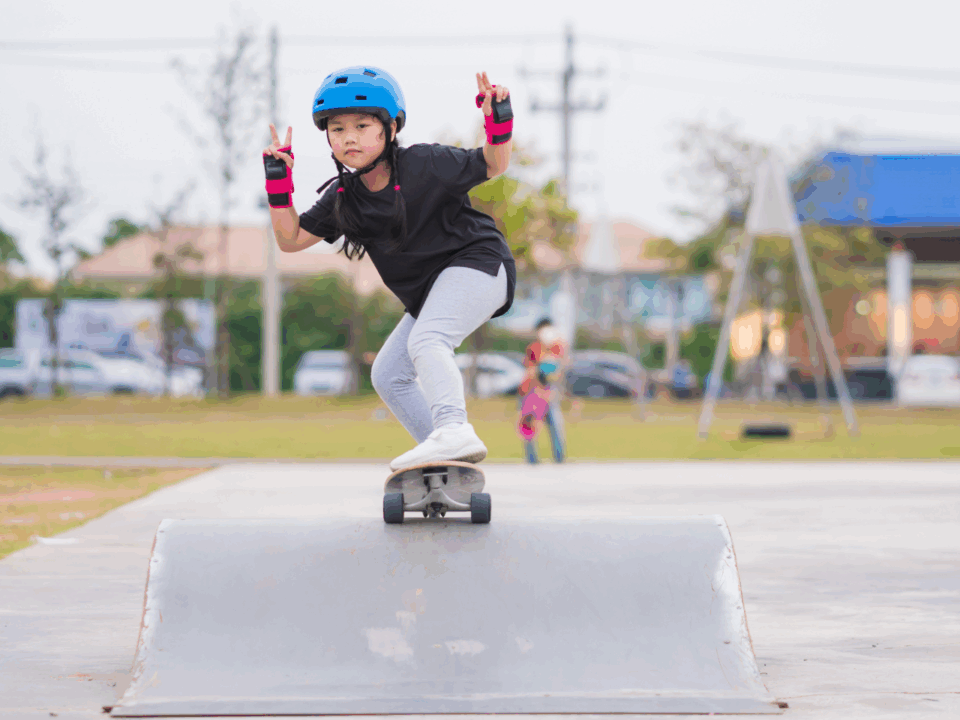Gone are the days of skateboarding being a boys’ club. Skate culture is shifting, and from Olympic podiums to neighborhood sidewalks, more girls are picking up boards and making the space their own. Thanks to social media, local skate collectives, and high-profile athletes like Rayssa Leal and Leticia Bufoni, girls have more representation in the sport than ever before. Skate spaces that once felt intimidating and male-dominated are transforming into places where girls can grow their confidence and find community.
The 2021 Skate Representation Survey, created by Mariah Davenport, found that participation rates of women in skateboarding increased by a staggering 790 percent over the previous decade. The study points to increased visibility—particularly on social media—as a key factor. Platforms like TikTok and Instagram have given female skaters a place to connect, share their progress, and learn from each other. These online communities have become a powerful force in normalizing women’s presence in skateboarding. This surge of participation is also reflected in the work of organizations like Yeah Girl, a global media platform dedicated to empowering women through skateboarding and creative expression. Through events, storytelling, and community-building efforts, Yeah Girl creates inclusive spaces for skaters to thrive both online and in real life.
Aside from social media, the culture shift in skateboarding is also visible across the country at the local level. Organizations like Launch Skate, a nonprofit indoor skatepark and youth center in Fort Collins, Colorado, are making concerted efforts to provide a community for girls in skateboarding.
“Our mission is to build community and resilience through skateboarding, and that means making sure everyone feels welcome, including girls,” says Andy Weiss, Launch’s Founder and Director. “We’ve been really intentional about creating an environment where girls are supported from day one.”
The welcoming atmosphere at Launch is making a difference. Girls are showing up and getting involved.
Weiss continues, “There’s been a clear rise in the number of girls getting into skateboarding. Part of that is due to better visibility—girls and women are showing up more in competitions, in media, and in brand partnerships … Culturally, the skate world is evolving to be more inclusive, and programs like ours at Launch are helping push that forward. When girls see that there’s space for them, they step into it and bring others with them.”
A 2024 study from Nottingham Trent University highlighted the many benefits of skateboarding for women, including improved body confidence, increased self-esteem, and overall mental well-being. Caroline Gevers, one of Launch’s female Skate instructors, says that the impact of girls’ skate programs goes beyond just learning cool tricks on a board.
“Skateboarding not only boosts girls’ confidence, but also strengthens their sense of belonging in a space they care about. The impact is honestly amazing to witness and one of my favorite parts about being part of Launch … I’ve seen girls go from shy and uncertain to bold and confident in the span of a one-hour lesson. Skateboarding helps them build confidence in such a natural, empowering way. They fall, get back up, and realize they’re capable of more than they thought.”
But despite the growing visibility and support, skateboarding can still present challenges for girls, especially in public skateparks.
Weiss explains, “Public skateparks can be intimidating, especially when you’re the only girl there. It’s tough to feel like you belong when the environment feels overwhelmingly male, or when you don’t see others who reflect your experience. We also hear a lot from female skaters about unsolicited advice. Even when it’s well-meaning, it can be frustrating to constantly have guys offer tips or guidance simply because you’re a girl. Most skaters appreciate help when they ask for it, but they don’t want to be treated like they need saving or hand-holding. That’s why it’s so important to create dedicated, judgment-free spaces where they can progress confidently on their own terms.”
Gevers echoes the sentiment from her own experience, saying, “A lot of girls—including me—have dealt with the feeling that skateboarding is a male-dominated space where they might not belong. There’s often a fear of being judged, especially when you’re just starting out. I still remember the anxiety of showing up to skateparks alone when I first began skating and how daunting that was. Gaining that initial confidence in your skating ability can be a big hurdle, but that’s where supportive, inclusive environments like Launch can really make a difference … Having friends, role models, and peers who uplift each other is such an important part of the skateboarding community!”
Launch is one of many organizations across the country creating space for girls to skate, but the movement is far bigger than any single park or program. Girls are showing up in skateparks everywhere, making their mark in competitions, and starring in major brand campaigns. A defining moment came with the debut of women’s skateboarding at the Tokyo 2020 Olympics (held in 2021), where young stars like Rayssa Leal, Sky Brown, and Momiji Nishiya competed and sent the powerful message that skateboarding isn’t just for boys, and that age or gender don’t limit what you can achieve on a board.
As the movement grows, so do opportunities. From organizations like Launch Skate and Yeah Girl to global stages like the Olympics, girls are carving out their place in the sport and inspiring others to follow. With every trick landed and every new rider who picks up a board, skateboarding’s future becomes brighter and more diverse.





